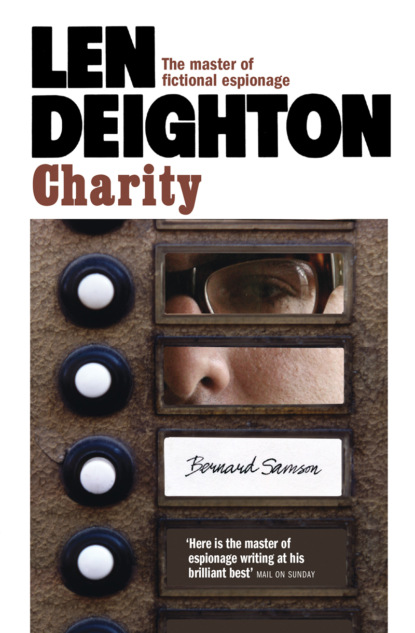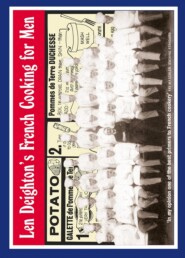По всем вопросам обращайтесь на: info@litportal.ru
(©) 2003-2025.
✖
Charity
Настройки чтения
Размер шрифта
Высота строк
Поля
‘You and Frank treat me like I’ve just got back from a drunken party to report a flying saucer. I’m not going to drop it until I’m satisfied.’ I gulped the rest of my drink, then got to my feet and looked around the room again. Werner was determined to play baby-sitter for me, and I wasn’t in the mood to be babied. I got enough of that from Frank all week.
‘Then don’t talk to me about it,’ said Werner. That’s all I ask.’
He didn’t say it quickly and angrily; he said it slowly and sadly. I didn’t give any attention to that fact at the time. Perhaps I should have done.
‘This smell of paint is terrible,’ I said. ‘When is this bloody idiot supposed to be opening this dump?’ I noticed with sadness that the old mural had disappeared under a couple of litres of white paint. It had been an imaginative array of hanging gardens, the great ziggurat and naked women dancing through palm trees, done by a drunken artist who had never travelled beyond the Botanical Gardens in Steglitz. I wondered what would replace it.
‘Next Tuesday the builders said, but now they are wavering. The carpenters haven’t finished and the painters have hardly started. They will have to finish and clear up completely before anyone can start polishing the floor. It will all take quite a time. Rudi is looking for somewhere else to hold his opening party. Somewhere bigger. Maybe a hotel.’
‘I can’t just walk away and forget about Tessa,’ I said. ‘I just can’t.’
Werner was closely studying some tiny spots of paint that had been splashed on the table-lamp.
By the time I left, the pianist was playing a Bach partita in a minor key. It wouldn’t be easy to dance to.
3
The North Downs, Surrey, England
When someone asks you to make an objective decision that will affect their future, you can confidently assume that they have already decided upon the course they intend to follow. So when my father-in-law phoned to be sure that I would be with Fiona when she visited the children at the weekend, I sensed that there was something else on his mind and I wasn’t expecting to hear anything comforting.
But those vague forebodings had faded a little by the time I was with Fiona in her shiny new Jaguar. It was one of the perquisites of her new post. The Department frowned upon senior staff using foreign cars, and a Porsche like the one she’d previously owned would have earned a quiet rebuke.
Fiona was at her magnificent best. She liked driving. Her dark hair was shiny and loose and wavy, and she had let it grow, so that it almost touched her shoulders, and swung wide to frame her face as she turned to smile at me. Her relaxed grin, natural skin texture and rosy cheeks reminded me of the young girl with whom I’d fallen so desperately in love. There was nothing to reveal her long ordeal in East Germany or the demanding workload that she now took upon herself without respite.
Escaping from London’s seemingly interminable squalor, and its brooding suburbs, is not easy. The beguiling villages that once surrounded the capital had become small plastic versions of Times Square. Even the snow could not completely conceal their ugliness. But finally we reached some stretches of open countryside, and eventually the lovely old house where Mr and Mrs David Kimber-Hutchinson made a home for my children. Set in a particularly attractive part of southern England, the house was secluded. There were trees on every side: pines and firs mostly, evergreens that ensured that the scene changed little in winter or summer. The house was Jacobean but successive wealthy owners, and acclaimed architects, had done everything possible to obliterate the original structure. Since my last visit David had squeezed permission from the local bureaucrats to further deform the property with a six-car garage. The new building had a lacquered-brass weather-vane on its red plastic roof, and automatic doors at both ends, so that he could drive right through rather than face the hazards and inconvenience of backing out.
Fiona turned off the road and drove through the entrance where wrought-iron gates entwined the monogram of my in-laws. ‘What a horror,’ she said as she caught sight of the new garage. Perhaps she’d said it to forestall any rude reaction that might have been my first response. The concertina doors were pushed back far enough to reveal her father’s silver Rolls, and the black Range Rover that was her mother’s current car. Her mother got through a lot of cars because each time she dented one she ‘lost confidence in it’. This latest one had been chosen by David and, on his specific instructions, fitted with massive steel crash bars at front and rear. As if in tacit warning to other road users, it was painted with a livery of formalized flame patterns along its side.
Fiona gave a toot on the horn and parked outside, alongside a battered little Citroën with Paris licence plates and a ‘Teachers against the Bomb’ bumper sticker. We got out and went into the garage, which was wide enough to take half a dozen Rolls-Royces and still have room for workbench, sinks, neatly coiled hoses and an air compressor. I inspected David’s latest pride and joy, a 3-litre Bentley open tourer, one of those shiny green icons of the nineteen twenties. Vintage cars had become his passion since a series of bad falls, and a bitter dispute with the master of foxhounds, had stopped him chasing foxes.
Her father was standing at the workbench when we arrived. He waved her forward, using both hands upraised as if marshalling a Boeing into its slot. He was wearing dark blue coveralls of the sort that garage mechanics favour, but peeping from the collar there was a yellow cashmere rollneck.
‘You made good time, darling,’ he announced approvingly as Fiona scrambled from the driving seat and kissed him.
‘We were lucky with the traffic,’ said Fiona.
‘And Bernard … what have you done to your face, Bernard?’ He was sharp, I must say that for him. My face was only slightly swollen and had drawn little reaction from others.
‘I walked into a bird-cage.’
‘Bernard, you …’
Fiona interrupted whatever her father was about to say: ‘Bernard fell down the stairs … in Berlin. He cracked a rib. He’s not fully recovered.’
Fiona knew where I’d got the bruises of course. We’d not spoken of it but she must have read my brief report about the Polish fiasco and guessed the bits I left out.
‘Watch yourself, Bernard,’ said her father, looking from one to the other of us as if suspecting that the whole truth was being withheld. ‘You’re not a youngster any more.’ And then, more cheerfully: ‘I saw you looking at the Bentley. She’s one hundred per cent authentic; not a replica or made up from new parts.’
‘It’s cold, Daddy. Let’s go inside the house.’
‘Yes, of course. I’ll show you later, Bernard. You can sit in her if you want.’ He led the way through a doorway that had been cut through a side wall of the original house to gain direct entrance from the garage.
‘That frost last night,’ he said as he opened the door into his carpeted drawing-room. ‘I think it may have killed the eucalyptus trees. I’ll be shattered if they go – after all the love and labour and money I’ve spent on them.’
‘Where’s Mummy?’
‘I have a tree expert coming this afternoon. They say he’s the man Prince Charles uses.’
‘Where’s Mummy?’
‘She’s resting. She gets up in the small hours and does all that yoga malarkey. Huh! And then she wonders why she gets tired.’
‘She says it’s doing her good,’ said Fiona.
‘Six o’clock is far too early. She runs the bath and that wakes me up,’ said David, ‘and then I sometimes have trouble getting off to sleep again.’ He slapped his hands together. ‘Now for elevenses, or would you prefer a real drink?’
‘It’s too early for me,’ said Fiona, ‘but I’m sure you can persuade Bernard to join you.’
‘No,’ I said. It was a culture trap. England’s holy ritual, of halting everything to sit down and drink sweet milky tea at eleven o’clock in the morning, would be marred by a dissenter guzzling booze, or even coffee.
‘I’ll order tea then,’ said David, picking up a phone and pressing a button to connect him to one of his many servants. ‘Who’s that?’ he asked, and having elicited the name of a servant he instructed: ‘Tell cook: morning tea for three in the Persian room. My usual – toasted scones and all that. And take tea to Mrs Hutchinson: Earl Grey, no milk, no sugar. Ask her if she’s going to join us for lunch.’
‘How lovely to be home again,’ said Fiona. I know she only said it to appease her father, but it made me feel as if I’d never provided a proper home for her.
‘And you are not looking too well,’ her father told Fiona. Then realizing that such remarks can be interpreted as criticism added: ‘It’s that damned job of yours. Do you know what you could be earning in the City?’
‘I thought they were firing people by the hundred after the crash last year,’ she said.
‘I know people,’ said David, nodding significantly. ‘If you wanted a job in the City you’d be snapped up.’ He leaned towards her. ‘You should come to the health farm with us tomorrow. Five days of rest and exercise and light meals. It would make a new woman of you. And you would meet some very interesting people.’
‘I have too much urgent work to do,’ said Fiona.
‘Bring it with you; that’s what I do. I take a stack of work, and my tiny recording machine, and do it away from all the noise and commotion.’
‘I have a meeting in Rome.’
He shook his head. ‘The life you people lead. And who pays for it? The poor old taxpayer. Very well then, it’s your life.’
‘The children are still studying?’ Fiona asked him.
It was not just her way of changing the subject. She wanted me to hear the wonderful things her parents were doing for our children. On cue, her father described the highly paid tutors who came to the house to give my children additional lessons in mathematics and French grammar, so that they would do well in their exams, and be able to go to the sort of school that David went to.
When the tea-tray came, everything was placed on the table before Fiona. While she was pouring the tea David divested himself of his coveralls to reveal a canary-coloured cashmere sweater, beige corduroy trousers and tasselled loafers. He spread himself across a chintz-covered sofa and said: ‘Well, what have you done with poor little Kosinski?’
Since David was looking at me as he said it, I replied: ‘I haven’t seen him for ages.’
‘Come along! Come along!’ said David briskly. ‘You’ve locked him up somewhere and you’re giving him the third degree.’











